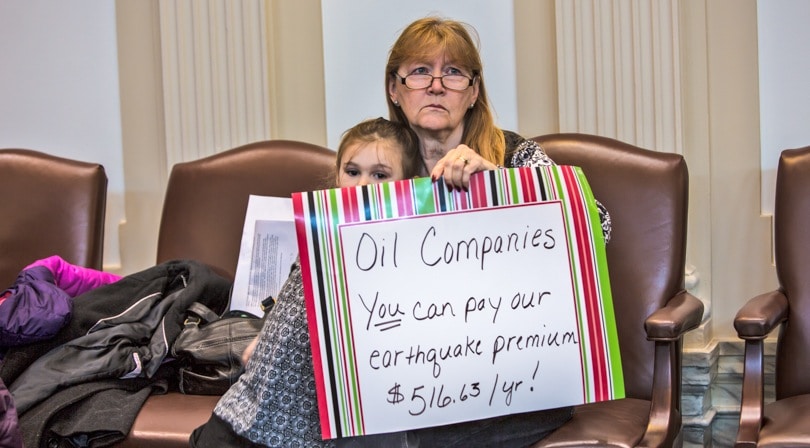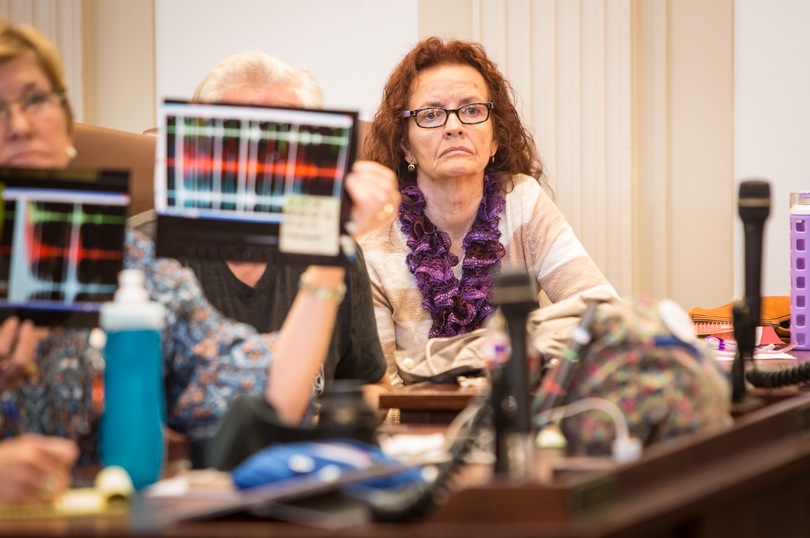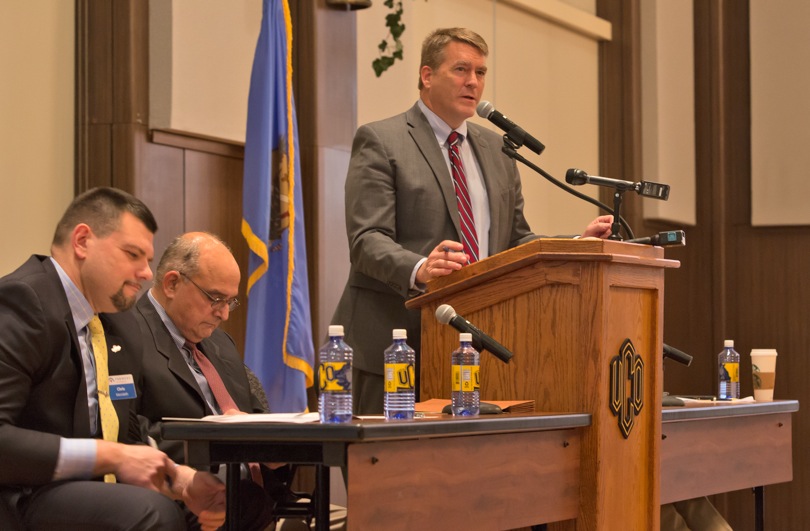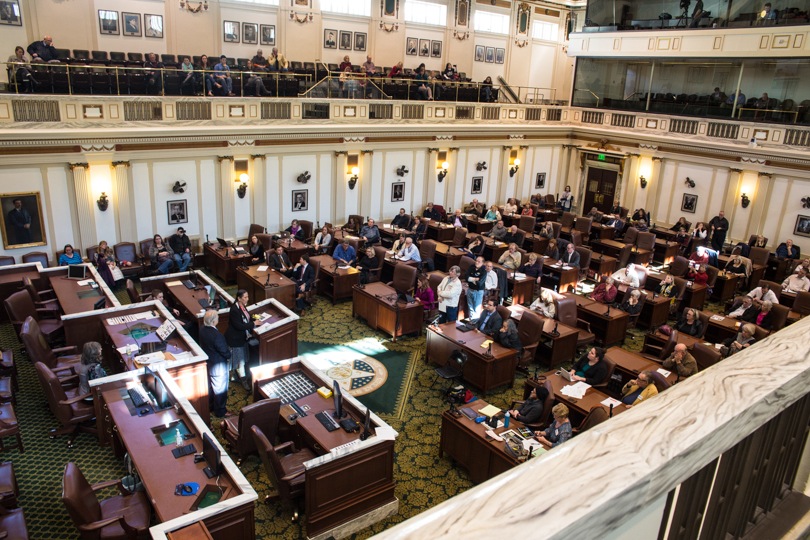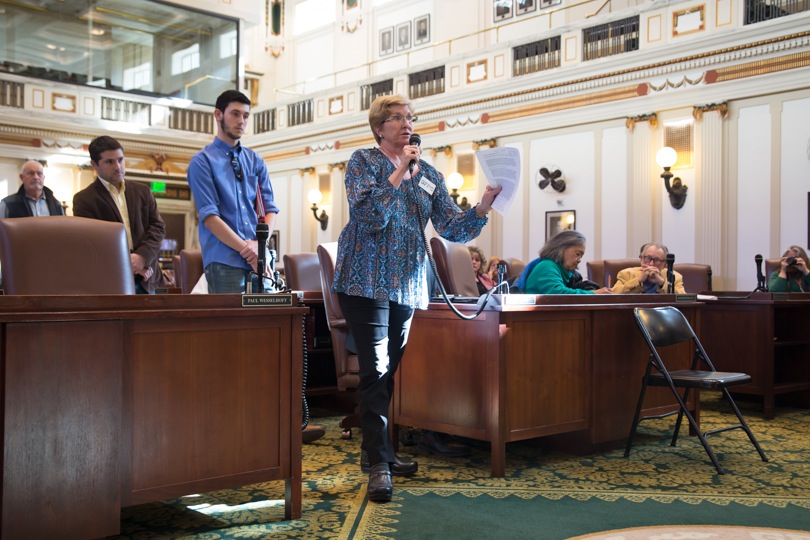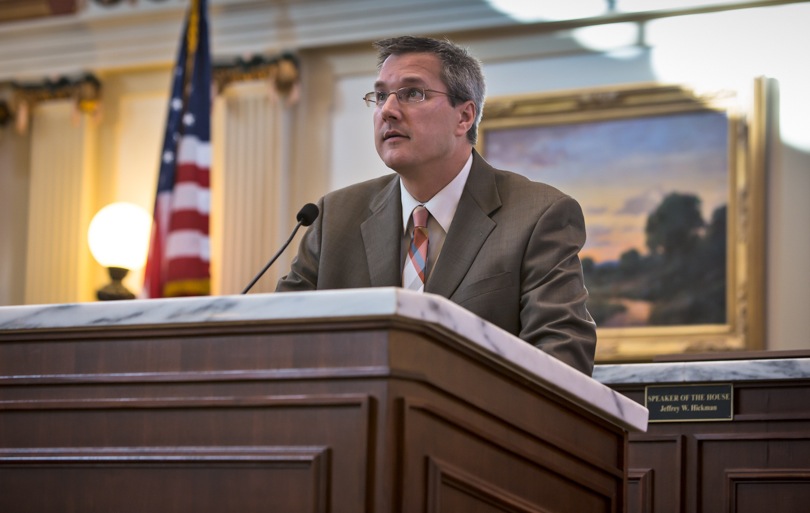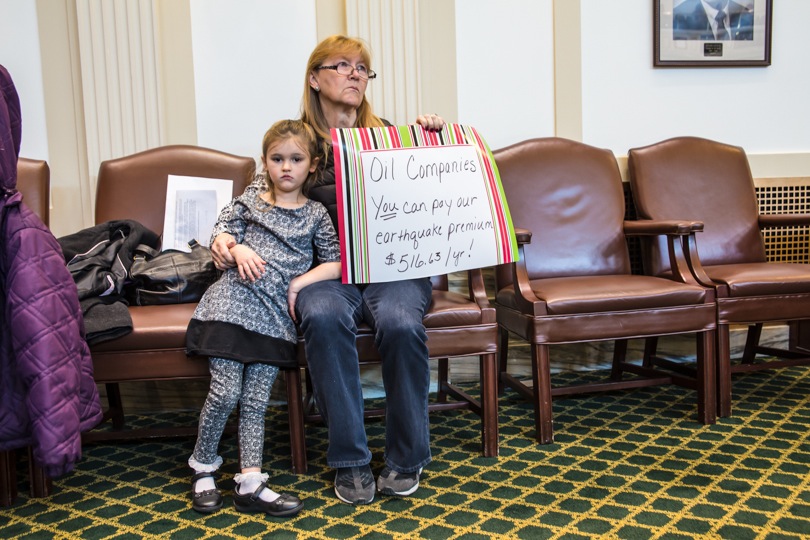Sara Winsted, a resident of Edmond, Oklahoma, an upscale Oklahoma City suburb, won’t be surprised if her house falls down before state legislators take action to stop the earthquakes.
Her feeling of hopelessness intensified after she attended two public meetings: a town hall organized by State Rep. Lewis Moore (R-Arcadia) at the University of Central Oklahoma (UCO) in Edmond, and a public hearing at the state capitol in Oklahoma City led by State Rep. Richard Morrissette (D-OKC).
Though the U.S. Geological Survey has determined the use of fracking wastewater disposal injection wells is the cause of the state’s earthquakes — and predicted a magnitude 5.5 or greater quake is probable — the use of disposal injection wells continues.
Sara Winsted at a hearing on earthquakes at the State Capitol. ©2016 Julie Dermansky
Winsted joined the grassroots group Oklahoma Coalition Against Induced Seismicity, which has called on legislators to pass a temporary moratorium on injection wells that are disposing of fracking wastewater.
Instead of doing that, state legislators passed SB 809 in May last year. The law limits the ability of local governments to regulate oil and gas operations. Now only the governor and the Oklahoma Corporation Commission (OCC), the agency that regulates the state’s oil and gas industry, can take any meaningful action.
The new law follows Texas legislation passed a few months after Denton residents approved a ban on fracking, negating the initiative.
Since DeSmog met with Winsted in 2014, the seismic activity impacting Oklahoma has not abated.
“In 2015 we had 907 quakes of a 3.0 magnitude and above. And now on January 14th and we have already had 59, and the day is still young,” Winsted said before the Edmond town hall in started. “What ever the OCC is doing is not enough.”
Ariel Ross, a professor of English at OSU and an organizer of Stop Fracking Payne County, thought it was great that people were finally given a forum to speak out, but was skeptical an event organized by Rep. Moore would lead to any kind of meaningful action.
“Moore has publicly asked if the quakes could be caused by drought,” Ross told DeSmog, “but now he is saying that there needs to be more action since his home has damage, and women are calling him concerned about their ‘nests.’”
Ross questions his authenticity and fears the meeting was a publicity stunt.
State Rep. Lewis Moore fielding questions at a tense town hall meeting. ©2016 Julie Dermansky
Moore opened the town hall with a presentation that claimed fracking isn’t part of the earthquake problem, it is only injection well use. He suggested finding alternative ways to dispose of the fracking industry’s wastewater.
Some in the audience hissed when he suggested finding a way to recycle the waste by spraying it on crops, as is being done in California. Then he proposed sending the wastewater to Texas. Sharon Wilson, Earthworks Gulf Coast representative, quickly let him know that Texas doesn’t want it.
Someone asked what it would take to get a moratorium on injection well use, and wanted to know who is in charge. Moore said Gov. Mary Fallin is the only one who holds power to call for a moratorium.
But Fallin, who didn’t attend either meeting, had previously stated that matters related to the earthquakes are in the OCC’s hands, and she has faith that it has the situation under control.
Moore pointed out that the OCC has asked oil and gas companies to reduce the amount of water they are injecting into wells. SandRidge Energy refused to comply, stating the OCC lacks authority to force them to shut down.
Moore hopes to be able to strengthen the OCC’s regulatory power, though some argued the regulators already have the power to force the issue, but lack the will.
None of Moore’s suggested alternatives to a moratorium on injection well use were well received.
Many cited other states’ decisions to shut down disposal wells where earthquakes became a problem, including Ohio and Arkansas. Once the injection wells stopped operating, the earthquakes stopped.
Moore claimed he wants to stop the earthquakes as much as the next person, because his wife is not happy about them either. He hopes that the wife of the Speaker of the House is upset, too, suggesting the wrath of politicians’ wives might kick the legislators into action.
VIDEO: Cathy Meadows Questions State Rep. Lewis Moore at a Town Hall Meeting in Edmond
“You are late to the party, whether your wife is upset or the Speaker of the House’s wife is upset,” Cathy Meadows, a resident of Edmond, told Moore.
“Fracking may not cause earthquakes, but you cannot frack without producing this dirty water,” Meadows said. “And until there is a comprehensive affordable plan to deal with this water, why do you not support a moratorium?” she asked Moore.
“This is an issue that will turn a red state blue,” Meadows warned, drawing a standing ovation.
“I have changed my prayer from ‘Dear Lord don’t take my home’ to ‘Dear God, don’t take my home before my insurance is canceled at renewal time in June,’” Beau Williams, an Oklahoma-based lawyer and co-counsel in an Oklahoma County class action lawsuit, told the crowd.
“The courts will move faster than the legislature,” Williams said.
The class-action represents everyone living in Oklahoma County. It includes suing for damages and asking for an injunction from a judge to stop fracking and saltwater injection at high pressure.
VIDEO: Rep. Richard Morrissette Calls For A Moratorium on Saltwater Injection Wells
Before the meeting ended, State Rep. Richard Morrissette (D-OKC) called for bipartisan action at the start of the next legislative session.
“This is an issue that is not political, When a house shakes, it is not a Republican or Democratic house,” he said. “We go into session on February 1, and by the end of the week we could have a bill and a moratorium against all saltwater injection wells.”
He encouraged Rep. Moore and everyone at the meeting to join him at the capitol the next day for the public hearing he was chairing.
VIDEO: Rep. Richard Morrissette Talks to DeSmog After the Town Hall meeting
Public Hearing on Earthquakes at the State Capitol
Casey Camp-Horinek at a hearing on earthquakes in the House Chambers of the State Capitol building. ©2016 Julie Dermansky
Rep. Moore wasn’t present at the beginning of the earthquake hearing at the State Capitol in Oklahoma City the next day when a crowd of more than 200 had to be moved from reserved small committee rooms to the Representatives’ House chambers.
Invited speakers included Insurance Commissioner John Doak; Todd Halihan, a hydrogeophysics professor from Oklahoma State University; Tulsa geologist Bob Jackman and Scott Poynter, an Arkansas attorney who filed a class-action lawsuit against oil and gas companies for damage caused by induced seismicity and will be seeking a federal injunction against saltwater injection well use on behalf of the Sierra Club’s Oklahoma chapter.
Commissioner Doak explained how insurance companies set policies based on catastrophic damage, not ongoing earthquake events. Insurance companies’ actions are based on past quakes. And since aftershocks can cause further damage, it is not unusual to impose a wait period on homeowners for filing a claim for a set number of days until after seismic activity stops.
But for homeowners, that is a quagmire, since seismic activity is a daily occurrence making it impossible to file their claim.
One homeowner asked why the injection well companies aren’t being forced to pay for everyone’s insurance since they caused the quakes.
Angela Spotts at the earthquake hearing in the State Capitol. ©2016 Julie Dermansky
Angela Spotts, the founder of Stop Fracking Payne County and a Stillwater homeowner, reminded everyone that the earthquakes were a national problem.
Not only would a large earthquake devastate the state, it would likely cause the companies that caused it to go under too, leaving taxpayers nationwide on the hook to pay for Oklahoma’s recovery. She gave a plug for Bernie Sanders because he is the only candidate against fracking.
Todd Halihan speaking at the State Capitol. ©2016 Julie Dermansky
Professor Todd Halihan explained the basic science behind the industry-induced earthquakes, and discredited a rumor spread by industry shills that a lake getting full was to blame for the earthquakes last year. He closed his presentation with his concern for children.
“No school will hold an earthquake drill to teach kids to climb under the desk, hold on and wait, not run, not get out of the building. I cannot persuade school districts to do this because either they don’t consider any hazard to exist or they are afraid of scaring children,“ Halihan said.
“Shakeout.org has instructions on how school administrators can run an earthquake drill,” he added, encouraging the audience to make administrators aware of that.
Oklahoma has not had a seismologist on staff since Austin Holland quit his post in July 2015. According to Bob Jackman, a former geologist for the oil and gas industry, it makes no sense the state doesn’t have a seismologist or its own geologist.
“It is like trying to cure Ebola without having a doctor.” Jackman warned if a big quake hits that impacts Cushing, where much of the nation’s oil reserve is stored, there will be “balls of fire.”
Anti-fracking activist Sharon Wilson, Earthworks’ Gulf Coast representative, offered the Oklahomans her services as a FLIR camera operator. FLIR cameras are used by regulators to document fumes not visible to the naked eye. She is willing to come and expose potential leaking gas at frack sites if anyone takes her up on her offer.
Earthworks did just that at Porter Ranch, California, helping to bring that gas leak to the nation’s attention with FLIR camera footage.
It isn’t just the earthquakes the fracking industry has brought to Oklahoma, she warned; it is water contamination and bad air, too.
Over the course of the hearing, Morrissette touched on the emotional issues brought up at the Edmond town hall. “How many children now sleep with you because they are scared?” he asked. Nearly all hands were raised.
He then encouraged those at the meeting to knock on Gov. Mary Fallin’s door, who, he suggested, might be watching the livestream of the event. He also scaled back his call for a moratorium from the night before, and instead talked about trying to overturn SB 809.
VIDEO: Casey Camp-Horinek Speaks at Hearing on Earthquakes
Spotts reminded Morrissette that some of the worst earthquakes have happened since the state started restricting wells, and that a total halt to wastewater injection is the state’s only hope to stop the quakes.
Casey Camp-Horinek, a representative from the Ponca tribe, challenged Morrissette, saying if he won’t call for a stop to injection well use, she will. She reminded him that her tribe isn’t represented by Gov. Fallin and is a sovereign nation.
Winsted left the first town hall meeting feeling energized and optimistic, but those feelings were short-lived. Her spirits were crushed by Morrissette, who went from saying he would introduce legislation to pass a moratorium that could possibly go into effect by the end of the first week of the new session, to suggesting weaker measures the next day.
Morrissette, who will term out after the 2016 session, seemed to be grandstanding for a possible run in the Senate, Winsted said.
Now that Oklahoma has become known as the most earthquake-prone place in the world, few are debating the science that disposing of fracking wastewater in injection wells is the cause of the earthquakes.
The state’s lack of action was described by Jackman as a bet with the devil.
Shirley Herkert with her granddaughter Caitlyn Zeno. ©2016 Julie Dermansky
Subscribe to our newsletter
Stay up to date with DeSmog news and alerts


